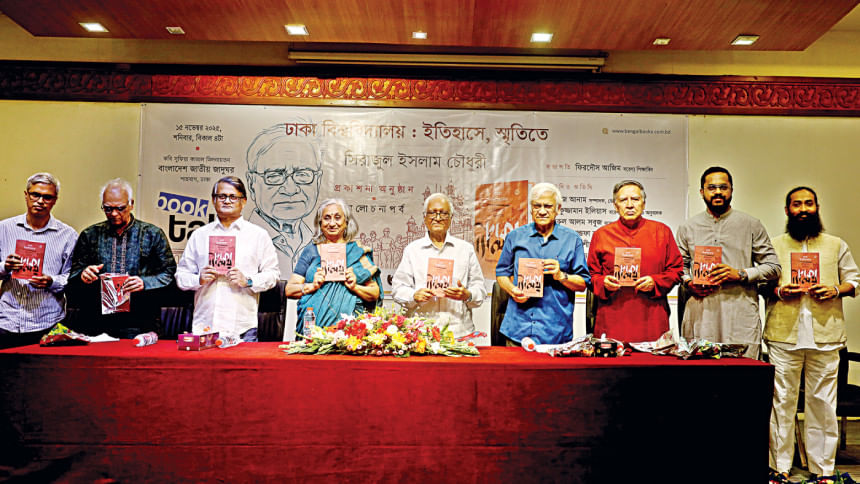‘Intellectual pursuit being overshadowed by capitalism’

Dhaka University Professor Emeritus Serajul Islam Choudhury yesterday expressed deep concern over the declining value of knowledge in today's society, saying capitalist priorities centred on wealth accumulation have overshadowed intellectual pursuit.He made the remarks at the launch of his book "Dhaka Bishwabidyalay: Itihashe, Smritite" (Dhaka University: In History, In Memory) at the National Museum in Shahbagh."Knowledge no longer holds its former value. The entire system has become so capital...
Dhaka University Professor Emeritus Serajul Islam Choudhury yesterday expressed deep concern over the declining value of knowledge in today's society, saying capitalist priorities centred on wealth accumulation have overshadowed intellectual pursuit.
He made the remarks at the launch of his book "Dhaka Bishwabidyalay: Itihashe, Smritite" (Dhaka University: In History, In Memory) at the National Museum in Shahbagh.
"Knowledge no longer holds its former value. The entire system has become so capitalist that people have become self-centred, forced to think only of themselves," he said.
"Students now go to libraries to prepare for BCS exams. Government jobs have become the most attractive option. The relationship between education and livelihood has been severed."
He criticised current development narratives, calling such development "hollow and fraudulent -- a development of deception."
"This development does not encourage education or value knowledge," said Prof Choudhury.
He addressed the deteriorating social status of teachers, citing imagery from recent protests for increased allowances.
The professor described a viral image showing broken glasses on the ground after a teacher was assaulted. "These broken glasses are a mark of teachers' dignity in society," he said.
"The current situation is very bad. Bangladesh's situation has never been good, but the level of hopelessness now is unprecedented," said Prof Choudhury.
"Hopelessness is the most serious issue, and that feeling has truly set in."
Despite the grim assessment, he expressed satisfaction at the gathering with fellow intellectuals. "I felt a sense of fulfilment in my life today."
The Daily Star Editor and Publisher Mahfuz Anam described himself as a lifelong student of Prof Choudhury's teachings.
He highlighted how the book discusses various vice-chancellors -- some who brought glory to Dhaka University and others who failed to protect its autonomy.
"After independence and for twenty to twenty-five years thereafter, the process of appointing vice-chancellors has been problematic. The guardians failed to make the university a centre of creative thought -- in some cases, shamefully failed," he said.
"Despite much oppression, students have maintained their core spirit of building an oppression-free, discrimination-free society. That passion for free thinking has manifested in many cases, which is a tremendous achievement for our nation," Mahfuz Anam added.
Academic and writer Ahmad Mostafa Kamal discussed the book's nine essays, noting that nearly all of them touch upon the Liberation War.
He said judging DU solely through conventional ranking systems overlooks its unique contributions.
He explained that the book shows that DU was established partly as compensation after the annulment of the partition of Bengal, with the British aiming to produce compliant civil servants.
"But they failed. Instead of producing compliant servants, this university became the epicentre of rebellion -- the Language Movement, the uprising, the Liberation War, and even the July uprising."
Writer Khalikuzzaman Ilias highlighted Prof Choudhury's advantage in having compiled nearly all DU convocation speeches.
"These speeches show how generations of leaders imagined the university -- sometimes as a place to produce obedient citizens and sometimes as a space for intellectual freedom," he said.
Calling the book "essential reading" for anyone entering DU, he said it shows the institution's resilience and ability to rise "like a phoenix".
Actor and playwright Khairul Alam Sabuj said, "In the British era, Dhaka University was not created to make us human beings. It was created to make us subservient. But the people of this country did not let that happen."
Researcher Kazi Sameeo Sheesh and Bengal Books Managing Director Mahmudul Hasan also spoke at the event.
The session was chaired by BRAC University Professor Firdous Azim.